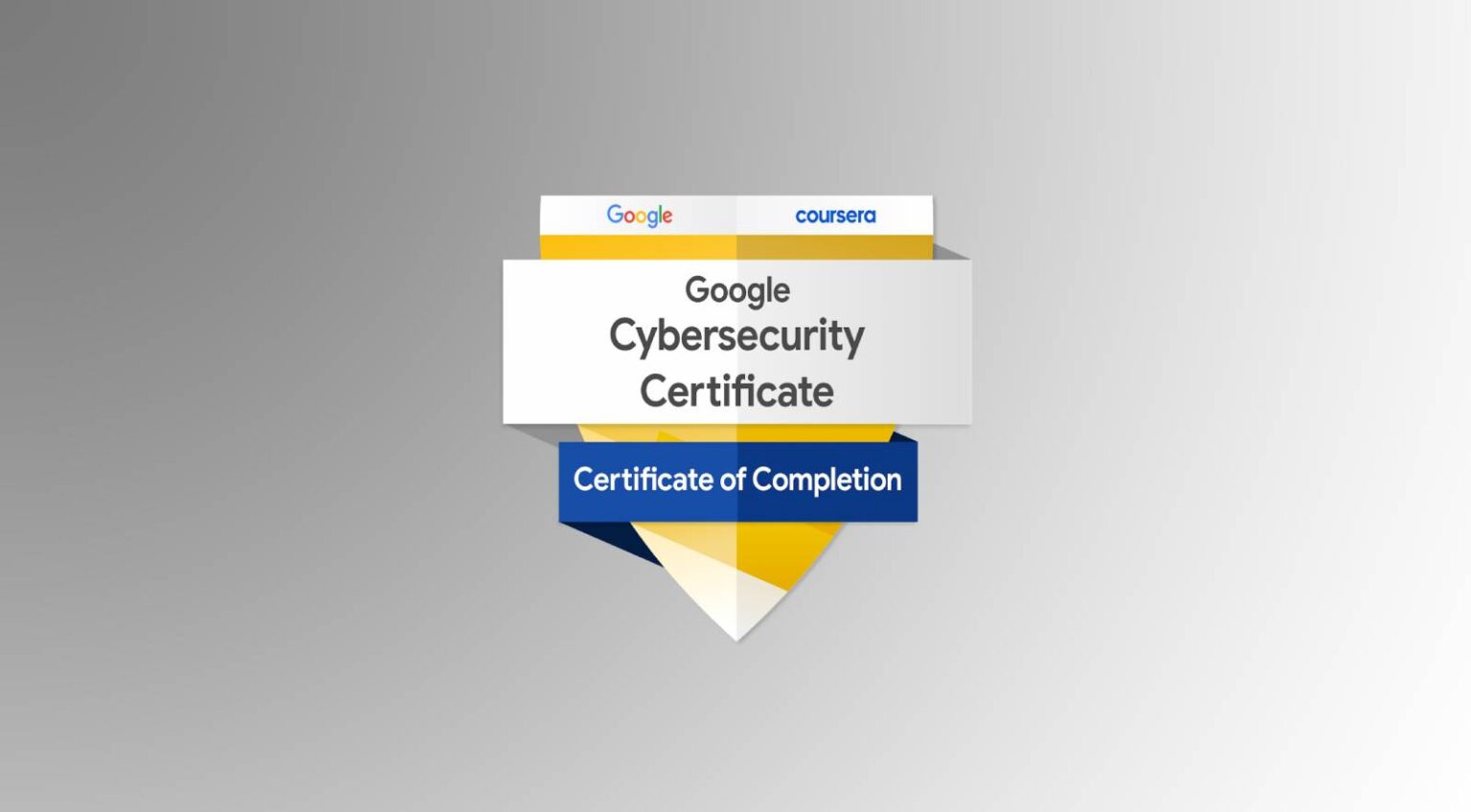Ever pondered how to dive into cybersecurity without a long college stint? Google’s Cybersecurity Professional Certificate could be your key. It’s drawn nearly a million students globally, and for a compelling reason.
What exactly is the Google Cybersecurity Certificate?
It’s your quick route into a booming career field. The Google Cybersecurity Professional Certificate is an 8-course online program for beginners. No experience or college degree is required to begin.
Google’s cybersecurity gurus crafted this program. They safeguard Google’s vast infrastructure daily. They pinpoint the skills employers seek.
Available on Coursera, it’s a top cybersecurity course. Over 969,000 students have signed up, making it extremely popular.
How much does it really cost?
Cost is a concern. The certificate is $49 monthly on Coursera. You get a 7-day free trial to explore.
Assuming a 6-month completion, the total is $294. That’s less than many spend on coffee yearly. Compare this to the tens of thousands for a college degree.
Some students finish quicker. One reviewer completed it in about 32 hours. That’s a 2-month finish if you’re focused.
Coursera Plus offers more for $59 monthly or $399 yearly. It’s like a learning Netflix.
What will you actually learn?
The program equips you for entry-level cybersecurity roles. Here’s what the 8 courses cover:
Course 1: Foundations of cybersecurity
You’ll grasp the basics. What is cybersecurity? Why do companies need it? What does a cybersecurity analyst do daily?
Course 2: Play it safe – Manage security risks
Risk management is key. You’ll learn to identify threats before they become issues.
Course 3: Connect and protect – Networks and network security
Networks are internet highways. You’ll learn to secure these digital paths.
Course 4: Tools of the trade – Linux and SQL
These are cybersecurity pros’ languages. Don’t worry, they start from the basics.
Course 5: Assets, threats, and vulnerabilities
What needs protection? What are the biggest dangers? How do hackers operate?
Course 6: Sound the alarm – Detection and response
When bad things happen (and they will), how do you respond swiftly and effectively?
Course 7: Automate cybersecurity tasks with Python
Python is like a super-smart assistant. You’ll learn to automate mundane tasks.
Course 8: Put it to work – Prepare for cybersecurity jobs
Resume writing, interview prep, and applying your knowledge in real-world scenarios.
The hands-on experience that matters
Google’s program stands out because it offers 125 hands-on activities and labs. You’re not just watching videos; you’re actively doing the work.
You’ll get to use real tools that cybersecurity experts rely on daily:
SIEM tools – These are like security cameras for computer networks. They monitor everything and alert you to any suspicious activity.
Intrusion detection systems – Think of these as digital burglar alarms for your computer.
Python programming – The go-to tool for automating cybersecurity tasks.
Linux command line – The backbone of the internet, running most of it unseen.
SQL databases – Where companies store their most critical information.
One student noted: “I find the labs engaging, and the quizzes help solidify my learning. The hands-on aspect makes it feel authentic.”

Portfolio projects that impress employers
Each course includes portfolio activities. These are not just assignments; they’re tangible proof of your skills for employers.
By the end, you’ll have concrete examples of:
- Security risk assessments you’ve conducted
- Incident response plans you’ve created
- Python scripts you’ve written to automate security tasks
- Network security configurations you’ve implemented
These portfolio pieces often become key points in job interviews.
How long does it really take?
Google officially states 6 months at 7 hours per week. But, actual students say this is far too optimistic.
One detailed reviewer estimated: “Each module takes about an hour for those familiar, maybe two for beginners. This totals around 32 hours.”
Studying 10 hours a week could finish the program in 3-4 months. If you study 15-20 hours a week, you might complete it in 2 months.
The program includes:
- 315 videos
- 232 readings
- 125 quizzes
- 125 hands-on activities
Job prospects and salary expectations
Now, let’s talk about the exciting part – your future career and salary. The cybersecurity field is booming.
There are currently 161,000 open cybersecurity jobs in the United States alone. Companies are eager for qualified professionals.
Salary-wise, the figures are impressive. The median salary for cybersecurity professionals with 0-5 years of experience is $115,000+. Entry-level positions typically range from $60,000 to $90,000 annually.
Specific roles you’ll qualify for include:
- Cybersecurity analyst – $60,000 to $80,000
- Security operations center (SOC) analyst – $65,000 to $85,000
- IT security analyst – $70,000 to $90,000
- Incident responder – $70,000 to $90,000
These are starting salaries. Experienced professionals often earn six figures.
Google’s employer network advantage
Here’s a huge benefit that many overlook. When you complete the certificate, you get access to Google’s exclusive employer network.
This includes over 150 major companies actively seeking to hire certificate graduates:
- American Express
- Deloitte
- Colgate-Palmolive
- T-Mobile
- Walmart
- Mandiant (now part of Google Cloud)
You can directly apply for jobs at these companies through Google’s platform. That’s like having a VIP pass to the job market.
CompTIA security+ preparation bonus
The Google certificate also prepares you for the CompTIA Security+ exam. This is the gold standard certification in cybersecurity.
Security+ has a passing score of 750 out of 900 points. About 70-75% of people pass on their first try. The exam costs extra (around $370), but having both certificates makes you incredibly marketable.
Many employers require Security+ for cybersecurity positions, including government contractors. Getting both gives you the best of both worlds – practical Google training plus industry-standard certification.
AI integration for modern cybersecurity
Google recently added AI training to the program. This isn’t just a marketing gimmick – AI is becoming essential in cybersecurity.
You’ll learn to use AI for:
- Identifying bugs and system vulnerabilities
- Refining and improving code
- Prioritizing security alerts
- Automating threat detection
Many cybersecurity professionals are catching up on AI. Learning it now gives you a competitive advantage.
Real student experiences and reviews

Let’s hear from actual students who’ve taken the plunge:
One military veteran shared: “I’ve started this course a while ago and am completing it soon. So far, I would say it’s good for beginners like me. I enjoy the labs, and the quizzes reinforce my learning.”
He also mentioned a downside: “One downside to this course is the lack of guidance when stuck at a module. I was stuck on module 4 for a while and had to figure it out myself.”
Another reviewer noted: “The course is engaging and keeps you interested while learning. Starting from the basics and incorporating numerous case studies and assignments, anyone can build a solid foundation in cybersecurity.”
Comparing to traditional education
How does this stack up against a college degree? It’s dramatically faster and cheaper, but more focused.
A computer science degree with cybersecurity focus takes 4 years and costs $40,000-$100,000+. The Google certificate takes 3-6 months and costs under $300.
The trade-off? College gives you broader knowledge and theoretical foundation. Google’s program gives you immediate, practical job skills.
For career changers or people who need to start earning quickly, Google’s approach is often the better choice.
The tools you’ll master
Let’s dive deeper into the specific tools and technologies you’ll learn:
SIEM Tools (Security Information and Event Management)
These include Splunk, IBM QRadar, and SolarWinds. They’re like mission control centers for cybersecurity teams.
Intrusion Detection Systems
Tools like Suricata, Snort, and Zeek help detect when hackers try to break in.
Python Programming
You’ll write scripts to automate security tasks. Even simple automation can save hours of manual work daily.
Linux Command Line
Most cybersecurity work happens on Linux systems. You’ll become comfortable with this powerful operating system.
SQL Database Queries
When investigating security incidents, you’ll often need to dig through database logs.
Global accessibility and recognition
The program is available worldwide, not just in the United States. Google has partnerships across Europe and other regions to help with job placement.
The certificate is recognized internationally because cybersecurity skills are universally needed. Every country faces cyber threats, so the skills you learn are globally valuable.
Financial aid and accessibility
Coursera offers financial aid for students who qualify. If the monthly fee is a barrier, you can apply for assistance.
There are also scholarships available through organizations like WiCyS (Women in Cybersecurity). They occasionally offer free access to 100 members at a time.
The bottom line: Is it worth it?
For most people interested in cybersecurity, yes, absolutely. Here’s why:
The investment is minimal compared to the return. Spending $300 could lead to a job paying over $70,000. That’s a remarkable return on investment.
The job market is hot right now. With 161,000 open positions and growing, demand far exceeds supply.
No experience required. You can start from zero knowledge and be job-ready in months.
Google’s brand carries weight. Employers recognize and respect Google’s training quality.
Yet, it’s not perfect. The program won’t make you a senior cybersecurity expert overnight. It’s designed for entry-level positions. For advanced roles, you’ll need more experience and certifications.
But as a starting point? It’s hard to find a better option that combines quality, affordability, and employer recognition.
Getting started: Your next steps
Ready to begin your cybersecurity journey? Here’s exactly what to do:
1. Sign up for the 7-day free trial on Coursera. This lets you explore the first course without commitment.
2. Set a realistic study schedule. Aim for 8-12 hours per week if you want to finish in 3-4 months.
3. Create a dedicated study space. Cybersecurity requires focus and concentration.
4. Join online communities. Reddit’s cybersecurity groups and LinkedIn groups can provide support and networking.
5. Start building your professional profile. Update your LinkedIn to show you’re studying cybersecurity.
The cybersecurity field is waiting for you. Every day you delay is another day of lost earnings. The Google Cybersecurity Professional Certificate could be your bridge to a secure, well-paying career in one of technology’s most important fields.
Whether you’re a recent graduate, career changer, or someone looking for better job security, cybersecurity offers opportunities that few other fields can match. With Google’s training program, those opportunities are more accessible than ever before.
Summary
Google Cybersecurity Certificate – your gateway to a high-demand tech career in just 6 months. This beginner-friendly program requires no degree or prior experience. It offers 8 courses with 125+ hands-on labs using real cybersecurity tools like Python, Linux, and SIEM systems. For $49/month on Coursera, you’ll learn threat detection, risk management, and AI-powered security strategies from Google experts.
Graduates qualify for 161,000+ open U.S. jobs with entry-level salaries ranging from $60,000 to $90,000. They also get exclusive access to Google’s hiring network, including Walmart, Deloitte, and T-Mobile. The certificate prepares you for the CompTIA Security+ exam, which is 79% faster and 90% cheaper than traditional education paths.
























